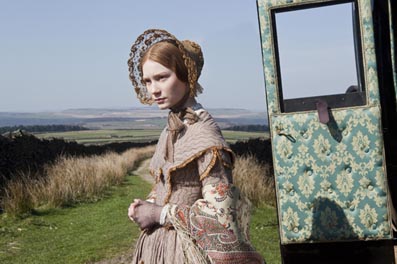 Dark, mercurial, intelligent and yes, dear reader, romantic—the most recent screen version of Charlotte Brontë’s Jane Eyre is utterly captivating. With its Pre- Raphaelite doorways, its Caspar David Friedrich fog-drenched forests, and its gothic vistas of sight (cinematography by Adriano Goldman) and sound (music by Dario Marianelli), this film will satisfy the pickiest audience on the planet—Brontë groupies who adore this tale of a “small, plain” young woman whose fierce spirit secures her place in literary Valhalla.
Dark, mercurial, intelligent and yes, dear reader, romantic—the most recent screen version of Charlotte Brontë’s Jane Eyre is utterly captivating. With its Pre- Raphaelite doorways, its Caspar David Friedrich fog-drenched forests, and its gothic vistas of sight (cinematography by Adriano Goldman) and sound (music by Dario Marianelli), this film will satisfy the pickiest audience on the planet—Brontë groupies who adore this tale of a “small, plain” young woman whose fierce spirit secures her place in literary Valhalla.
Director Cary Fukunaga (a UCSC alum) has deepened the sense of mystery surrounding the manor house of the restless Rochester (Michael Fassbender), just as he has mined the intelligence of Jane‘s (Mia Wasikowska) uncompromising gaze. These two are made for each other as only unmatched, unfettered individuals can be. Derbyshire’s sweeping moors are burnished into almost byzantine golds and bronzes by Marianelli’s poetic camerawork, forming an intrepid landscape for Fukunaga’s explorations. In league with Moira Buffini’s screenplay, Fukunaga uses a single disarming cinematic device — and that is to plunge us immediately into the middle of the narrative, and then use long, languid “flashbacks” to fill in key elements. Not only does this decision work well, it invigorates our relish of the tale.
A few key elements, including the masterful Judi Dench, underplaying her part as the gossipy housekeeper Mrs. Fairfax. The elegant Fassbender manages to dislodge the persistant ghost of Orson Welles (in one of the most famous screen versions of Jane) with his angular sharp eye, off-kilter mouth and wounded elegance. This is a Rochester less brooding than complex, even bored, whose intellect first, then his heart are captured by Wasikowska’s utterly distinctive, bold Jane.
This Jane Eyre is fraught with emotional and political tensions, yet never stoops to stereotypical male/female dialectics. In no other version of this story has the psychological counterweight of the “other” man—St. John Rivers (played with spiteful gentility by Jamie Bell) been so vividly articulated. As Brontë intended, Jane’s character is agonized and clarified as much by whom she cannot accept, as much as by the one she longs for.
It is a gorgeously dark glimpse of the soul compressed into underground labyrinths, leading ultimately to a richly satisfying resolution. A hugely gratifying film experience, and even if you know exactly how it will end, when it does, you will sigh nonetheless. That’s quite an achievement on the director’s part— to take us into known territory and make it ring with some bracing new authenticity. I just talked myself into seeing it again. Jane Eyre, @ the Nick.

